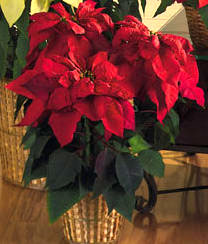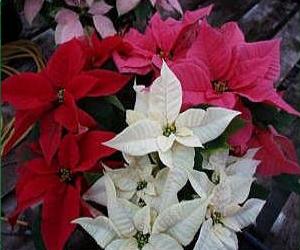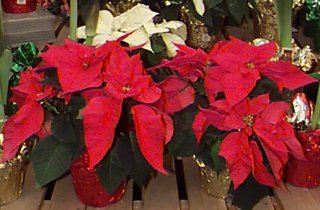|
Plants
for your home
(By Mary Efanti)
Poinsettia
Description
- Origin
 Many
or most of us have received a poinsettia as a gift for Christmas.
No doubt, poinsettias are one of the most beautiful and famous Christmas
flowers, and are native to Mexico. Many
or most of us have received a poinsettia as a gift for Christmas.
No doubt, poinsettias are one of the most beautiful and famous Christmas
flowers, and are native to Mexico.
Now
that Christmas is gone and the beautiful red leaves of your poinsettia are
drying up and falling off, do not discard of the whole pot together with any
other Christmas decorations. Although
many people consider poinsettias to be annuals, if you take care of it and
provide for its needs, it can live and bloom for years.
Poinsettias
are easily identified by the color of the leaves that surround their tiny
flowers in the center. These leaves
are usually red, but could be white or pink as well. Their height could be anything from 15 cm to over 1 meter
under suitable conditions and care.
Care
 After
the end of the “blooming” period, prune back the plant to half its height or
prune approximately 5 cm over the main branches. While pruning you will notice a white sappy liquid, much like
the liquid you notice when cutting poppies in the spring. Wash your hands thoroughly as this liquid may cause some
people skin irritation. After
the end of the “blooming” period, prune back the plant to half its height or
prune approximately 5 cm over the main branches. While pruning you will notice a white sappy liquid, much like
the liquid you notice when cutting poppies in the spring. Wash your hands thoroughly as this liquid may cause some
people skin irritation.
If
you kept the pot inside your home until now, take it outside so that the
temperature is lower. An average
temperature of 12-15 C is ideal. Reduce
watering drastically, adding just a little water once every 15 days, however
even if you do not water at all, the moisture of the atmosphere during winter is
adequate to sustain the plant.
After
some time, you will notice new growth. If
you plan on repotting now is the time, but take care not to disturb the roots
more than necessary. As soon as new
growth appears start watering as often as any other plant.
When the weather warms up a bit, its rich green foliage will compensate
for this extra care, foliage which will be growing continuously until the next
“blooming” period.
 Leave
the pot on your balcony, in a bright spot but keep the plant away from the hot
rays of the sun during summer. In
summer, poinsettias need plenty of water but in order to avoid root rot, water
only when you notice the leaves start to wither and discard of the excess water
on the pot-plate. During hot
days, you might need to water daily and make sure that the pot drains well. Leave
the pot on your balcony, in a bright spot but keep the plant away from the hot
rays of the sun during summer. In
summer, poinsettias need plenty of water but in order to avoid root rot, water
only when you notice the leaves start to wither and discard of the excess water
on the pot-plate. During hot
days, you might need to water daily and make sure that the pot drains well.
In
order for your poinsettia to bloom next year, you have to provide total darkness
for approximately 14 hours every day for 2 whole months.
If the plant gets less darkness than that, it will bloom sometime in
spring but plan ahead if you wish to have a blooming poinsettia in time for
Christmas. Keep in mind that
nurseries have evolved miracle working techniques in order to force blooming, so
let nature have its way and don’t get disappointed if your plant blooms in
March.
Always
check often for insects and diseases such as scale that (seldom) may infect your
poinsettia. If you have scale-prone
plants like scheffleras keep your poinsettias as far away as possible.
There is also a
beautiful Christmas story about poinsettias.
To read it click here!
Mary Efanti
[email protected]
|
